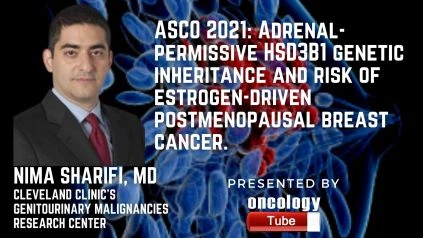Nima Sharifi, MD, director of Cleveland Clinic’s Genitourinary Malignancies Research Center speaks about ASCO 2021 – Abstract – Adrenal-permissive HSD3B1 genetic inheritance and risk of estrogen-driven postmenopausal breast cancer.
Link to Abstract:
https://meetinglibrary.asco.org/record/197176/abstract
Background information:
There are no known genetic variables that influence endogenous estrogen synthesis and the risk of postmenopausal breast cancer. We wanted to see if the homozygous inheritance of the 1245AC missense-encoding polymorphism in HSD3B1, which is common (8-10%) in White populations, functionally adrenal permissive, and increases the synthesis of the aromatase substrate androstenedione, is linked to postmenopausal estrogen receptor-positive breast cancer.
Methodologies:
HSD3B1 genotype, circulating steroid concentrations, and adrenal-permissive genotype frequency in postmenopausal estrogen receptor-driven breast cancer were determined and compared to the genotype frequency in the general population and estrogen receptor-negative breast cancer in a prospective single-institution study. Two breast cancer genetic studies with estrogen receptor evidence were used for validation. The adrenal-permissive genotype frequency in postmenopausal estrogen receptor-positive breast cancer and the general population is the key result. The relation between circulating adrenal androgen concentrations and postmenopausal estrogen receptor-negative breast carcinoma genotypes was also investigated.
The following are the outcomes:
There were 199 and 1628 women in the prospective and validation trials, respectively. In the prospective cohort, 17.5 percent (21/120) of postmenopausal White women with estrogen-driven breast cancer had the adrenal-permissive genotype, compared to 9.6 percent (429/4451) in the general population [p = 0.0077]. Using the Cambridge and TCGA genomic datasets together, the adrenal-permissive genotype frequency for estrogen-driven postmenopausal breast cancer was confirmed: 14.4% (56/389) compared to 6.0 percent (9/149) for estrogen receptor-negative breast cancer (p = 0.007) and the general population (p = 0.005). The adrenal-permissive genotype had a considerably greater circulating androstenedione concentration than the other genotypes (p = 0.03).
Final Thoughts:
Estrogen-driven postmenopausal breast cancer is linked to the adrenal-permissive genotype. These findings establish a link between endogenous estrogen exposure and estrogen-driven breast cancer in postmenopausal women, with broad implications for risk stratification, prevention, potential biomarkers for hormonal therapy response, and possibly other clinical outcomes related to estrogen physiology.

